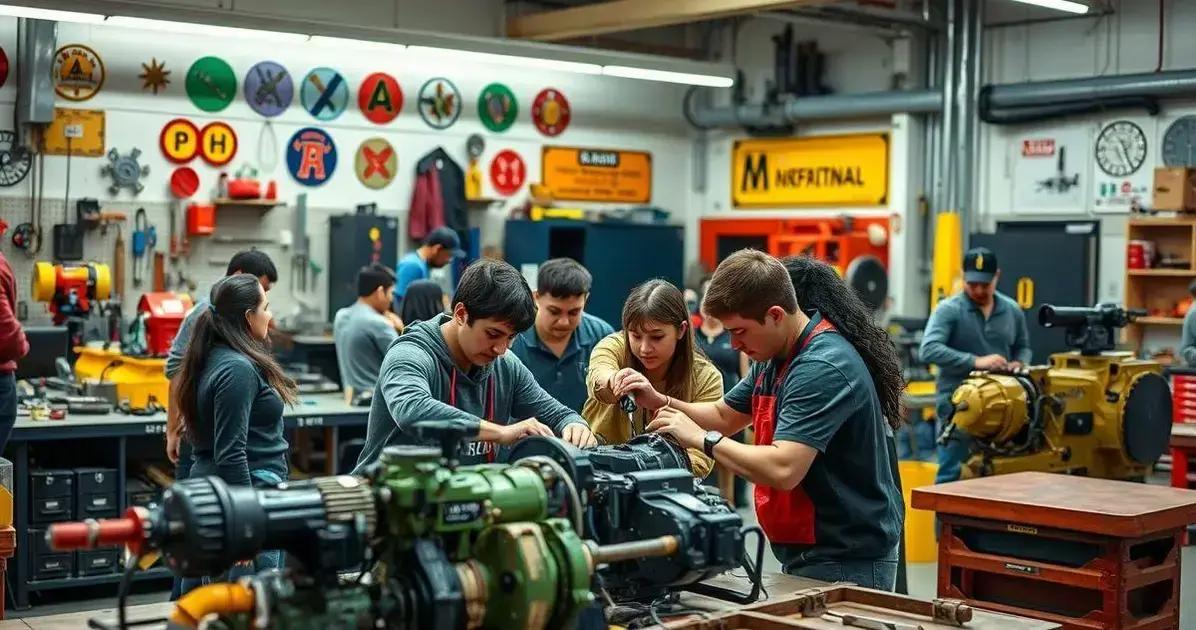Trade School: Uncover the Secrets to Unlocking Your Future Success Today
Anúncios
**Trade School** offers an alternative path to career success that’s both practical and efficient. Many students are considering **Trade Schools** as a way to gain valuable skills without the burden of excessive student loans. This decision often leads to immediate employment in high-demand fields. In this article, we’ll explore the advantages of attending a **Trade School**, how they prepare you for the workforce, and what careers you can pursue. Discover why a **Trade School** might be the smartest choice for your future.
Why Choose Trade School Over Traditional College?
Opting for a Trade School over a traditional college can be a wise decision for many. Trade schools provide specialized training that can lead to quicker employment in skilled jobs like welding, plumbing, and electrical work. These programs are typically shorter, aiming to get students into the workforce faster without the long time commitment of a four-year degree.
Cost Efficiency
Traditional colleges often come with a hefty price tag. In contrast, trade schools tend to cost less, featuring programs focused solely on skill acquisition. This means less debt and more savings for students in the long run, a substantial benefit in today’s economy.
Smaller Class Sizes
Trade schools generally have smaller class sizes, fostering more personalized attention from instructors. This can enhance learning experiences, ensuring students truly grasp the skills needed to excel in their chosen careers.
Real-Life Experience
Unlike the theoretical focus of many traditional colleges, trade schools emphasize hands-on experience. This practical approach prepares students to meet the demands of their careers upon graduation effectively.
For students seeking a straightforward path to a well-paying job, exploring trade school options could be the key to unlocking future success.
Top Benefits of Attending a Trade School

Attending a Trade School offers numerous advantages that appeal to many individuals seeking a defined career path. One significant benefit is the shorter duration of study. Most trade programs last between six months to two years, allowing students to enter the workforce much sooner than traditional four-year programs.
Hands-On Training
Trade schools emphasize practical, hands-on training, which is crucial in skilled trades. This approach ensures students master essential techniques and tools, preparing them thoroughly for real-world job scenarios.
High Job Placement Rates
Another benefit is the high rate of job placement upon graduation. Trade schools often have strong connections with local businesses and industries, offering students excellent networking opportunities.
Affordable Education
The cost of attending a trade school is generally less than that of traditional colleges and universities, making it an appealing option for those concerned with avoiding substantial debt.
Students can embark on stable careers in fields like healthcare, automotive repair, and construction by choosing trade school. These fields are always in demand, providing job security and a promising career future.
Discover High-Paying Careers You Can Pursue After Trade School
Completing a program at a Trade School can open the door to numerous high-paying careers. One excellent option is becoming an Electrician. With the increase in solar energy and smart home technology, the demand for electricians is on the rise. This career offers competitive salaries and opportunities for growth.
Healthcare Opportunities
Trade schools also prepare students for well-paying healthcare roles, such as Radiologic Technologist and Dental Hygienist. These professions offer stable career paths and the opportunity to help others while earning a good income.
Technology and Mechanics
Careers in technology and mechanics are another lucrative route. Fields like Commercial Truck Driving or HVAC Technician are in constant demand, offering steady employment and rewarding paychecks.
For those interested in creative trades, becoming a Cosmetologist or a Chef could be appealing. These careers are not only high-paying but also provide the chance to express creativity through work.
How Trade Schools Prepare You for the Workforce

Trade Schools excel in preparing students for the workforce by focusing on the skills employers need. Programs are designed to reflect current industry standards, ensuring graduates are work-ready from day one. One key advantage is the emphasis on hands-on training. Students apply what they learn in real-world settings, gaining experience that sets them apart in the job market.
Strong Industry Connections
Trade schools maintain strong links with industries, often collaborating with companies to design curriculum and provide internship opportunities. These relationships help students network and open doors to potential jobs after graduation.
Career Services
Many trade schools offer dedicated career services that provide support such as resume building, interview coaching, and job placement assistance. This approach ensures students are fully equipped to succeed in their careers.
By focusing on applicable skills and providing practical experience, trade schools offer a direct path to employment. This structure is ideal for individuals eager to enter the workforce immediately and begin a rewarding career.
Trade Schools vs. Apprenticeships: Which is Right for You?
Deciding between Trade Schools and Apprenticeships can be tricky, as both offer valuable paths to skilled careers. Trade schools provide structured programs where students learn specific trades through classroom instruction and hands-on practice. This route usually offers a comprehensive curriculum, covering everything needed for entry-level positions.
Learning on the Job
On the other hand, apprenticeships focus on learning directly in the field. Apprentices work alongside experienced professionals, gaining real-world experience while being paid. This method allows learners to earn as they learn, which can be a big draw for many.
Duration and Cost
Trade schools typically have a fixed duration, usually one to two years, and come with tuition costs. Apprenticeships might last longer, up to four years, depending on the trade, but they often cost less since they are employer-sponsored.
Both paths lead to certification or licensure, which is crucial for trade careers. When choosing, consider your learning style, financial situation, and career goals to determine which option best suits your needs.
Finding the Best Trade School for Your Career Path

Choosing the right Trade School is crucial to ensuring a successful career. Start by identifying schools that offer programs aligning with your career objectives. Research the school’s accreditation status, as attending an accredited institution can impact job prospects and certification eligibility.
Program Reputation
Investigate the reputation of their programs. Look for reviews or testimonials from former students to gauge program quality and outcomes. Schools with strong job placement rates can also be beneficial, as they may have better connections with local industries.
Location and Cost
Consider the location and cost of the trade school. Nearby schools can reduce travel costs, while some institutions might offer financial aid or scholarships. Ensure the school fits within your budget without compromising on quality.
Visit potential schools whenever possible. Touring the campus provides insights into the facilities, tools, and resources available. Choosing a trade school aligned with your personal and professional needs is a significant step towards a thriving career.
Embarking on Your Trade School Journey
Choosing a Trade School can be the first step towards a rewarding and stable career. By understanding the benefits, such as cost efficiency and hands-on training, it’s clear why many opt for this path over traditional college.
Uncover high-paying careers that suit your skills and interests, and take advantage of the job-readiness programs trade schools offer. Whether you prefer a structured learning environment or seek on-the-job experience through apprenticeships, the options are abundant.
Ultimately, selecting the right school involves careful research into each institution’s offerings, reputation, and placement success. As you navigate these choices, you’ll uncover the secrets to unlocking a successful career and a prosperous future.
FAQ – Frequently Asked Questions about Trade Schools and Career Paths
Why should I choose a trade school over a traditional college?
Trade schools offer focused, hands-on training for specific careers, have shorter programs, and usually cost less than traditional colleges.
What are high-paying careers I can pursue after trade school?
Careers in fields such as electrical work, healthcare, technology, and mechanics offer high salaries and demand skilled trade school graduates.
How do trade schools prepare students for the workforce?
Trade schools provide practical training, industry connections, and career support services, ensuring students are well-prepared for employment.
How do I decide between a trade school and an apprenticeship?
Consider your learning preferences and financial situation. Trade schools offer structured education, while apprenticeships provide paid, hands-on experience.
What should I consider when choosing a trade school?
Evaluate accreditation, program reputation, job placement rates, location, and cost to find a trade school that fits your career goals and budget.






